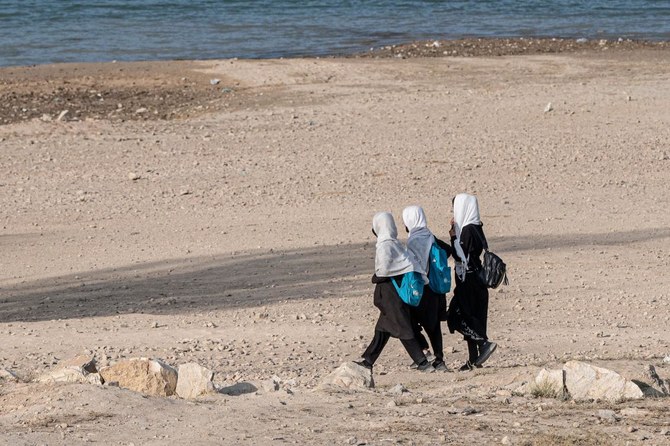WASHINGTON: The Biden administration said Thursday it was giving temporary legal status to Afghan migrants who have already been living in the country for a little over a year.
The Department of Homeland Security said in the announcement that the decision to give Temporary Protected Status to Afghans who arrived after March 15, 2022, and before Sept. 20, 2023, would affect roughly 14,600 Afghans.
This status doesn’t give affected Afghans a long-term right to stay in the country or a path to citizenship. It’s good until 2025, when it would have to be renewed again. But it does protect them from deportation and give them the ability to work in the country.
A relatively small number of people are affected. On Thursday the administration announced it was giving Temporary Protected Status to nearly 500,000 Venezuelans in the country.
But many Afghans who would benefit from the new protections took enormous risks in getting to the US, often after exhausting all other options to flee the Taliban-controlled Afghanistan. Supporters have argued that they are deserving of protection.
“Today’s decision is a clear recognition of the ongoing country conditions in Afghanistan, which have continued to deteriorate under Taliban rule,” Eskinder Negash, who heads the US Committee for Refugees and Immigrants, said in a statement.
Separately, the Department also continued the protected status for a smaller group of Afghans — about 3,100 people. That group already had protection but the administration must regularly renew it.
The news Thursday would not affect tens of thousands of other Afghans who came to the country during the August 2021 American airlift out of Kabul or Afghans who have come over the years on special immigrant visas intended for people who worked closely with the US military or government.
Afghans who recently arrived in US get temporary legal status from Biden administration
https://arab.news/zbgkr
Afghans who recently arrived in US get temporary legal status from Biden administration

- Decision to give Temporary Protected Status to Afghans who arrived after March 15, 2022, and before Sept. 20, 2023, would affect roughly 14,600 Afghans
- This status doesn’t give affected Afghans a long-term right to stay in the country or path to citizenship
Italy tries to fill its Albanian migrant center after legal woes

- Government in attempt to salvage a costly scheme frozen for months amid efforts to curb refugee influx
ROME: Italy’s government said it would use its Albanian migrant centers for people awaiting deportation, the latest attempt to salvage a costly scheme frozen for months by legal challenges.
The two Italian-run facilities, located near the coast in northern Albania, were opened last October as processing centers for potential asylum seekers intercepted at sea, an experimental project closely watched by EU partners.
But Prime Minister Giorgia Meloni’s ministers agreed on Friday that the centers will now primarily serve as repatriation facilities to hold migrants who are due to be sent back to their home countries.
BACKGROUND
The modification means that migrants who have already arrived on Italian shores could be sent across the Adriatic to a non-EU country to await their repatriations.
The modification means that migrants who have already arrived on Italian shores could be sent across the Adriatic to a non-EU country to await their repatriations.
Meloni, whose far-right Brothers of Italy party has vowed to cut irregular migration, has cast the scheme as a “courageous, unprecedented” model.
But the plan has run into a series of legal roadblocks, and the centers have stood mainly empty.
Italian judges have repeatedly refused to sign off on the detention in Albania of migrants intercepted by Italian authorities at sea, ordering them to be transferred to Italy instead.
The European Court of Justice, ECJ, is now reviewing the policy.
On Friday, Interior Minister Matteo Piantedosi said the new decree modifying the Albania plan “allows us to give immediate reactivation” of the migrant centers.
“The plan is going ahead,” he told journalists, saying the use change “will not cost €1 more.”
The scheme was signed between Meloni and her Albanian counterpart, Edi Rama, in November 2023.
Under the plan, Italy would finance and operate the centers, where migrants considered to be from “safe” countries, and therefore unlikely to be eligible for asylum, would have their cases fast-tracked.
The first group of 16 migrants arrived in October, but they were promptly sent to Italy after judges ruled they did not meet the criteria.
Italy responded by modifying its list of so-called “safe countries,” but judges ruled twice more against subsequent detentions and referred the issue to the ECJ, which is expected to issue a ruling after May or June.
Meloni’s coalition government has cast the court rulings as politically motivated.
Italy’s opposition has decried government waste over the experiment, due to it costing an estimated €160 million ($173 million) per year, even as rights groups have worried that migrant protections would not be respected in the centers.
On Friday, former prime minister Matteo Renzi, a centrist, said the facilities would require a further €30 million to €50 million were they to be transformed into repatriation centers, calling them “useless structures, creatures of Giorgia Meloni’s propaganda.”
The leader of the center-left opposition Democratic Party, Elly Schlein, challenged the legal basis of the modification, saying European law “does not allow a repatriation center to be relocated to a third country.”
“The government has no qualms about trampling on fundamental rights and wasting more resources of Italians with its empty and harmful propaganda,” she wrote.
Immigration lawyer Guido Savio said that with the change announced on Friday, the government is trying to show that it can “make them work” while casting itself at the forefront of an “innovative” European policy on migration.
Savio said the changes will allow the government to prepare early for a draft EU regulation that would provide for outsourcing migrant centers to non-EU, so-called third countries, which is not due to take effect before 2027.
But Fulvio Vassallo Paleologo, another immigration attorney, predicted an “avalanche of appeals” after the latest government action, which he said has “no legal basis.”
The latest move has “highly symbolic” importance for the government, which “does not want to show the failure of the Albania model,” he said.
Undocumented migration via the Central Mediterranean route between North Africa and Italy fell by 59 percent last year, with 67,000 migrant arrivals, according to European border agency Frontex, due to fewer departures from Tunisia and Libya.
UN condemns killing of peacekeeper in Central African Republic

- The country has been in conflict since 2013, when predominantly Muslim rebels seized power and forced then-President François Bozize from office
BANGUI: The UN has condemned the killing of a Kenyan peacekeeper in an ambush of a patrol in the east of the Central African Republic.
Florence Marchal, the spokesperson for MINUSCA, the peacekeeping mission in the Central African Republic, said the soldier was killed during a UN patrol near the village of Tabant, 24 km northwest of Sémio.
Marchal said Valentine Rugwabiza, the UN Secretary-General’s Special Representative for the Central African Republic, “condemns this attack in the strongest possible terms” and is “extremely shocked by this despicable attack on peacekeepers whose mission is to protect civilian populations.”
Government spokesperson Maxime Balalu said that government and law enforcement authorities would do everything possible to bring the perpetrators to justice.
The A Zande Anikpigbe militia carried out the ambush, according to Semio official Amadou Bi Djobdi.
“This is an act that cannot be tolerated. There is no more room for anarchy, and the bandits must face up to the law,” Djobdi said.
Despite its vast mineral wealth, including gold and diamonds, the Central African Republic remains one of the world’s poorest countries. Rebel groups have often operated with impunity, thwarting mining exploration by foreign companies.
The country has been in conflict since 2013, when predominantly Muslim rebels seized power and forced then-President François Bozize from office.
Six of the 14 armed groups that signed a 2019 peace deal later left the agreement.
Locals and the government have credited Wagner forces with preventing rebels from taking control of Bangui in 2021.
The country is one of the first in which the Russia-backed mercenary Wagner Group established operations with the pledge of fighting rebel groups and restoring peace. Wagner forces have served as personal bodyguards for President Faustin Archange Touadera, helping him win a constitutional referendum in July 2023 that could extend his power indefinitely.
The A Zande Anikpigbe militia is one of several such groups that Wagner mercenaries have trained in recent years.
Wagner Group regional chief Dimitri Syty said last year that the militia had been committing atrocities “because they’re cut off from the country” and that Wagner’s training has helped integrate it into the national army.
Medical supplies shortage hampering Myanmar quake response: UN

- “As the full scale of the disaster unfolds, urgent humanitarian assistance is needed to support those affected,” the UN humanitarian agency OCHA said
- WHO said it had rushed nearly three tons of medical supplies, including trauma kits and multi-purpose tents
GENEVA: A severe lack of medical supplies is hampering efforts to respond to the deadly earthquake in Myanmar, the United Nations said Saturday, adding that those affected needed urgent humanitarian aid.
The UN said it was mobilizing emergency response efforts, alongside humanitarian partner organizations, following the huge earthquake that struck on Friday leaving more than 1,600 people dead in Myanmar and neighboring Thailand.
“As the full scale of the disaster unfolds, urgent humanitarian assistance is needed to support those affected,” the UN humanitarian agency OCHA said in a statement.
It said the response was being hindered by a lack of medical supplies, along with damaged roads and communications infrastructure.
“A severe shortage of medical supplies is hampering response efforts, including trauma kits, blood bags, anaesthetics, assistive devices, essential medicines, and tents for health workers,” OCHA said.
The agency said hospitals and health facilities had sustained extensive damage or had been destroyed.
“Telecommunications and Internet disruptions continue to hinder humanitarian communications and operations. Damaged roads and debris are obstructing humanitarian access and complicating needs assessments,” it added.
OCHA said coordination efforts were under way to conduct rapid needs assessments and scale up the emergency response.
“The earthquake caused widespread destruction of homes and severe damage to critical infrastructure,” it said.
“Thousands of people are spending the nights on the streets or open spaces due to the damage and destruction to homes, or fearing further quakes.”
In central and northwestern Myanmar, hospitals in Mandalay, Magway and the capital Naypyidaw “are struggling to cope with the influx of people injured.”
In the southern part of Shan state, multiple townships have been affected, with clothing, blankets, emergency shelters and food assistance needed immediately, OCHA said.
The agency said a convoy of 17 cargo trucks from neighboring China carrying shelters and medical supplies was expected to arrive on Sunday.
Meanwhile the World Health Organization said it had rushed nearly three tons of medical supplies, including trauma kits and multi-purpose tents, from its emergency stockpile in Yangon to hospitals in Mandalay and Naypyidaw treating thousands of people injured in the quake.
“Immediate support is critical to save lives,” its South-East Asia branch said on X.
Jagan Chapagain, secretary general of the International Federation of Red Cross and Red Crescent Societies (IFRC) — the world’s largest humanitarian network — said Red Cross teams in Myanmar were “racing against time” to rescue survivors, provide pre-hospital care and distribute emergency shelter materials.
In a video from Yangon, Marie Manrique, the IFRC’s acting head of delegation in Myanmar, said the numbers of fatalities and injuries were continually increasing.
“We do have some uplifting stories of actually finding people... however, the sad stories will continue to be coming in,” she said.
Besides infrastructure, many houses have collapsed, “and we really need to start thinking of what is going to happen to these people and their long-term housing needs,” she added.
Fitness enthusiasts challenge themselves with pre-iftar hikes in Pakistani capital

- Hikers set out hour before sunset, break fast on trails on Margalla Hills National Park
- Participants say pre-iftar hikes help boost fat burning, maintain weight in Ramadan
ISLAMABAD: Zarnab Tahir struggled to catch her breath as the steep incline of the hiking trail at Islamabad’s picturesque Margalla Hills tested her endurance. Hiking can put people through physical exertion, especially when they do it on an empty stomach.
An hour before the sun sets and the call to prayer blares out from various mosques located in Pakistan’s capital city, a group of fitness enthusiasts take to the hiking trails in Margalla Hills National Park.
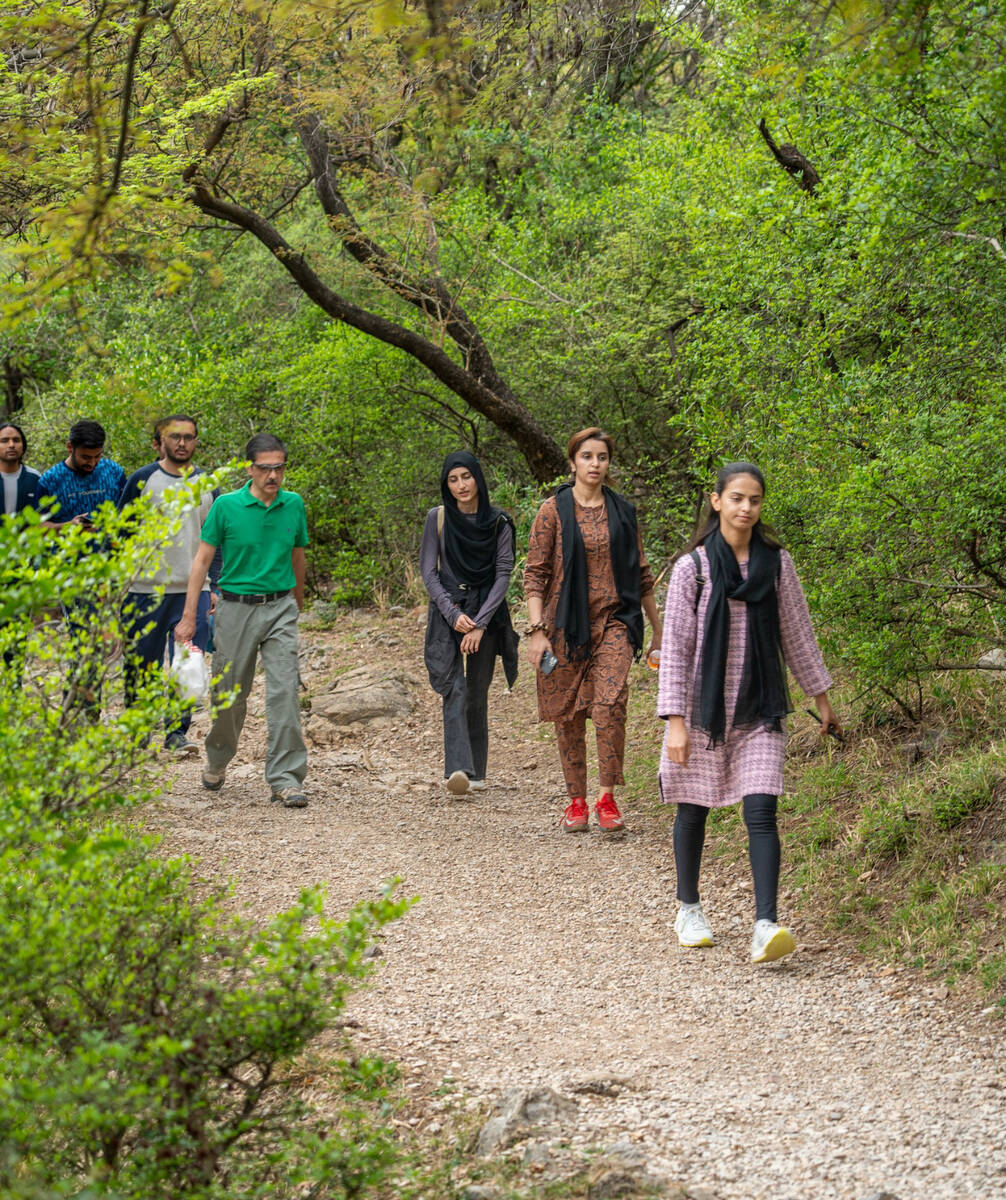
Islamabad Run With Us — IRU — which describes itself as Pakistan’s “pioneering running community,” is behind the pre-iftar hiking initiative.
“When you engage in pre-iftar (physical) activities during Ramadan, it gives you extra energy, an extra boost,” Qasim Naz, who founded IRU in 2016, told Arab News on hiking trail number three.
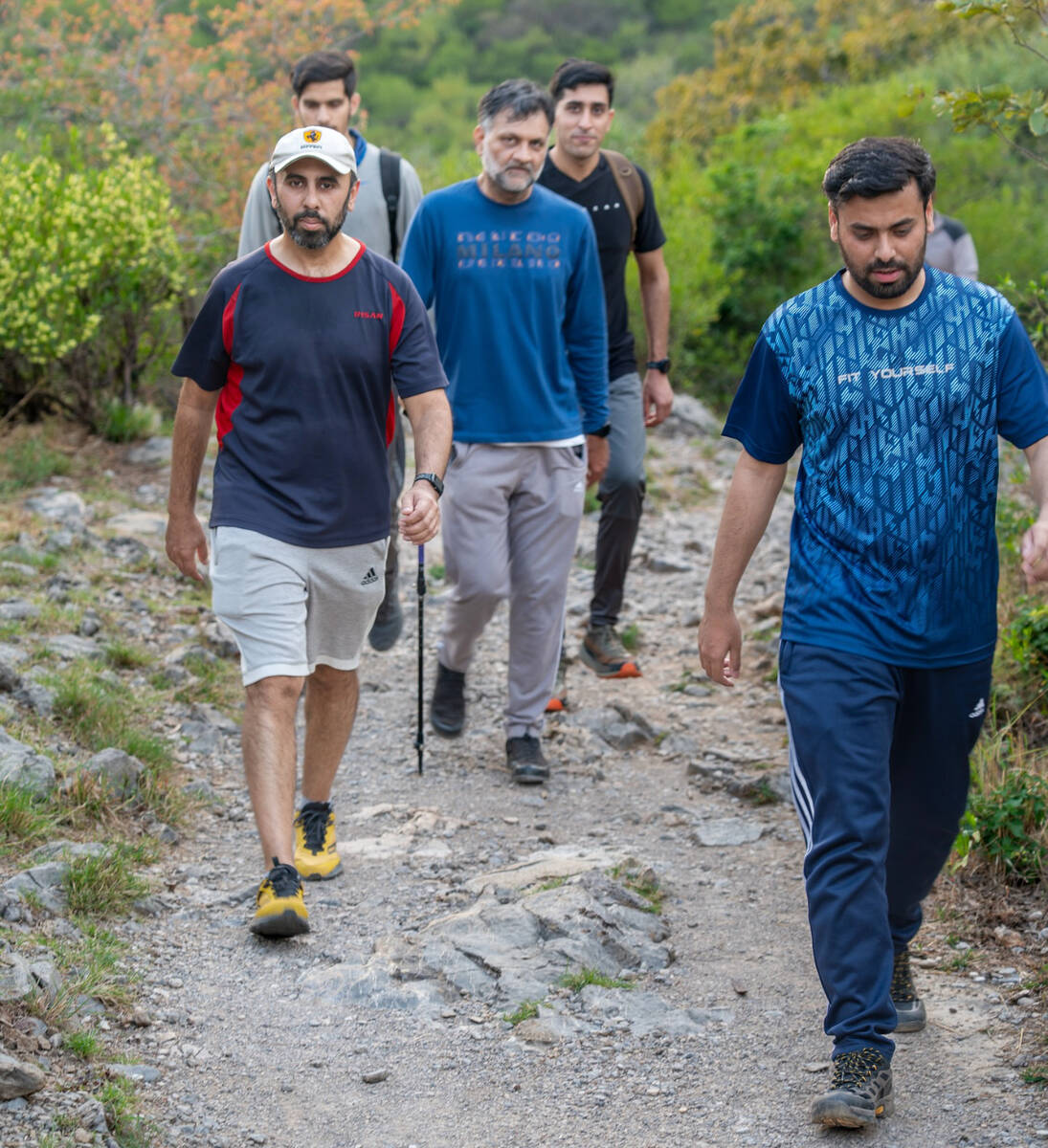
“And when someone joins in on an activity once or twice, they figure out it’s not that hard and they can sustain it comfortably.”
Naz stresses that staying active during the holy month is essential. The IRU organizes five activities a week, which include two runs and three hikes.
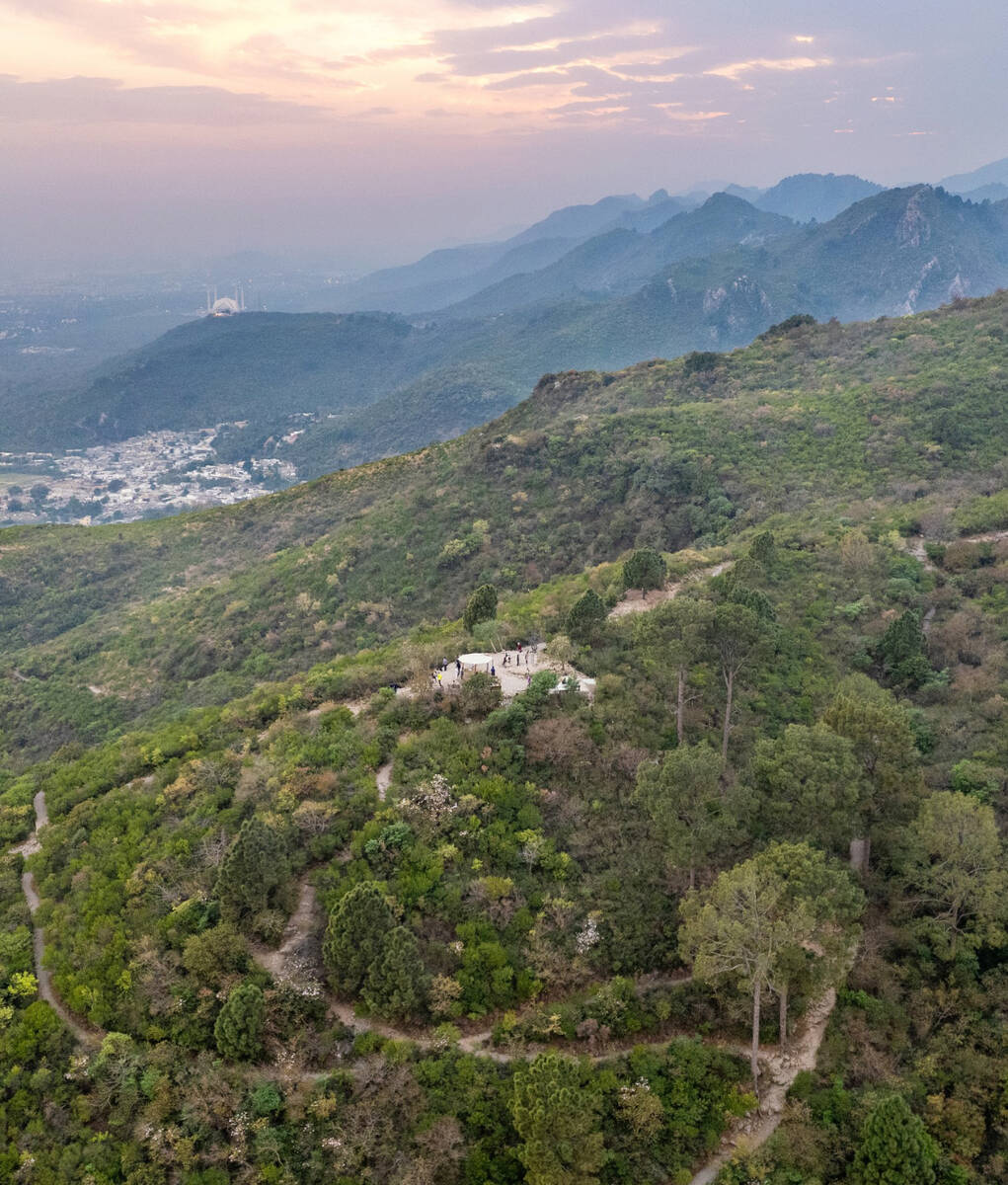
“Either we can maintain our weight, or if our goal is weight loss, we can achieve it by being in a calorie deficit while eating a healthy diet and exercising,” Naz explained.
Tahir, 22, meanwhile, said that she was committed to reaching the top of hiking trail before sunset. This was the second time she was hiking with IRU.
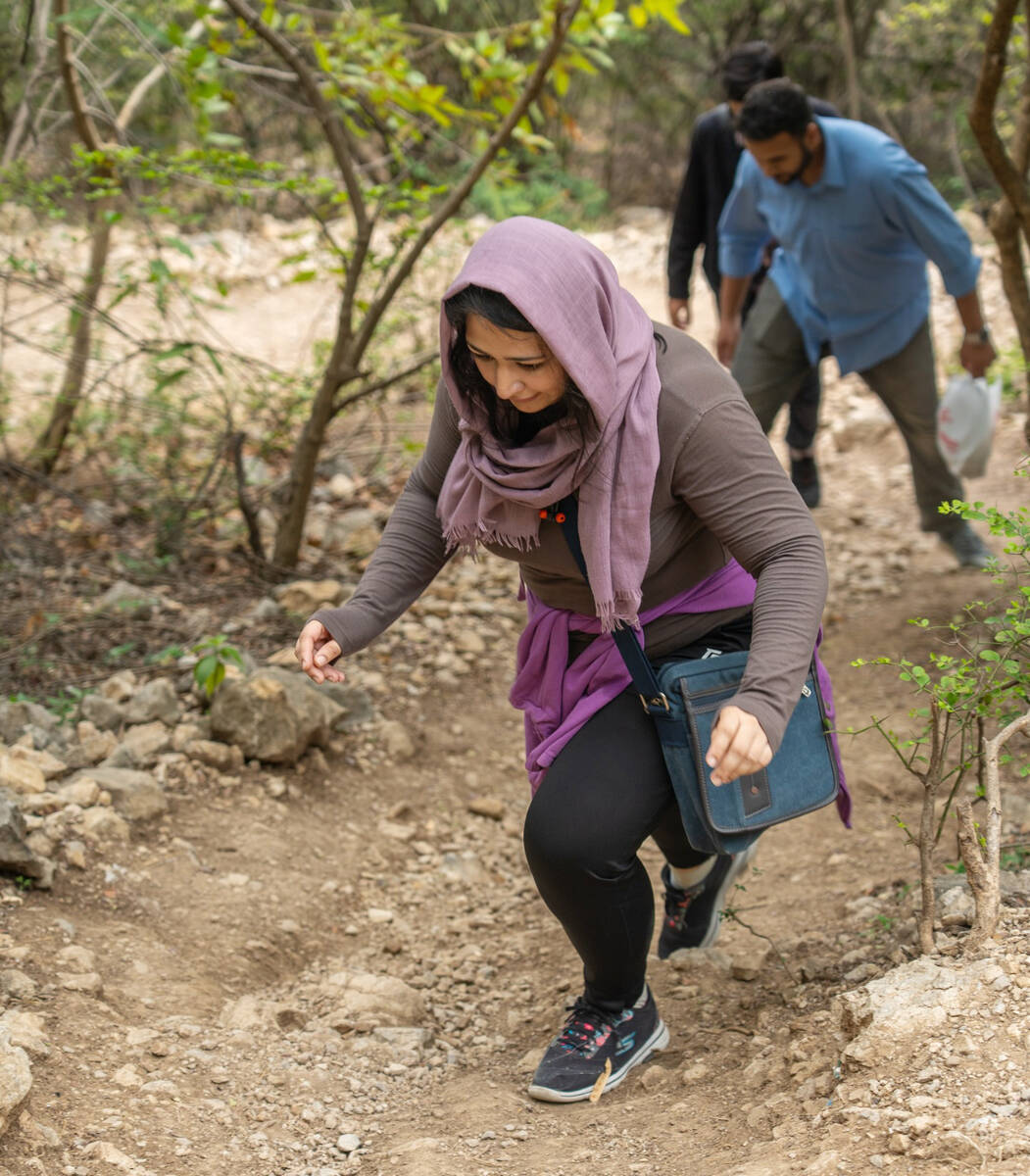
She agreed with Naz that group activities are “much easier” to sustain.
“I think it is important to go at your own pace and it’s so much easier with the group,” Tahir, a content creator, told Arab News.
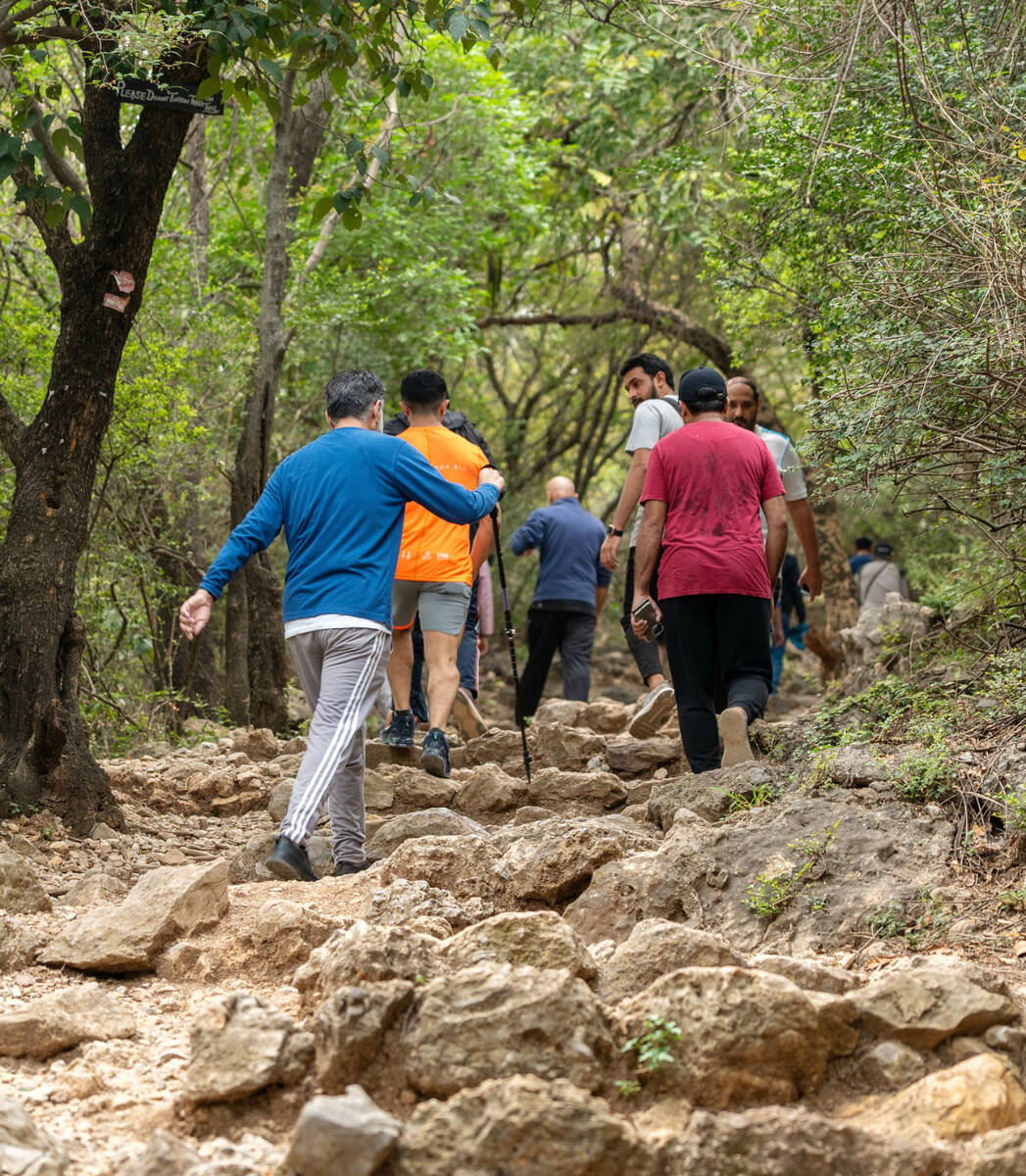
“If you go alone, it’s kind of more difficult and you are, like, really slow but if you go with the group you can maintain that pace and I think it’s much easier that way.”
Mahwish Ashraf, a journalist associated with a foreign diplomatic mission in Islamabad, shared how she struggled the first time that she went on a pre-iftar hike with IRU.
“The first time I was hiking, I returned from in between, I couldn’t complete it,” she admitted. “So, this is my second time hiking with the IRU, and gladly, I’m at the main point, the meeting point.”
Eraj Khan, a commercial specialist visiting from Australia to spend Ramadan with his family, said pre-iftar hikes give one “lots of energy.”
“For fat burning, it’s a great activity,” Khan said. “Especially because the last two hours of fasting are the hardest, most people feel really hungry. But so far, I’m loving it.”
As the clock continued to tick and evening settled in, the hikers began to pick up their pace. For Tahir, reaching the top of the trail before sunset was a victory in itself.
She had pushed past exhaustion, embraced the challenge and proved to herself that she was capable of more than she thought she could achieve.
And according to her, hiking with the group made all the difference.
“The energy of the group keeps you going,” she said. “Even when you feel like stopping, you see everyone else moving forward, and you push through.”
US woman released by Taliban in Afghanistan

- “American citizen Faye Hall, just released by the Taliban, is now in the care of our friends, the Qataris in Kabul, and will soon be on her way home,” Khalilzad wrote on X
- Khalilzad posted a picture of Hall smiling with Qatar representatives ahead of her departure from Afghanistan
WASHINGTON: An American woman has been freed by the Taliban in Afghanistan after she, two Britons and their Afghan translator were detained earlier this year, Washington’s former envoy to Kabul, Zalmay Khalilzad, said Saturday.
“American citizen Faye Hall, just released by the Taliban, is now in the care of our friends, the Qataris in Kabul, and will soon be on her way home,” Khalilzad, who has been part of a US delegation working on Taliban hostage releases, wrote on X.
While at the Qatari embassy in Kabul, Hall “has been confirmed in good health after undergoing a series of medical checks,” said a source with knowledge of the release.
She was released on Thursday following a court order and with logistical support from Qatar, the source added.
Hall, who has been identified by the Taliban’s interior ministry as Chinese-American, was detained in February along with Peter and Barbie Reynolds, who are in their 70s, as they traveled to the British couple’s home in central Bamiyan province.
Their Afghan translator was additionally arrested.
Taliban officials have refused to detail the reasons for their arrest, but one report said Hall had been detained on charges of using a drone without authorization.
In his announcement, Khalilzad posted a picture of Hall smiling with Qatar representatives ahead of her departure from Afghanistan.
Khalilzad had been in the Afghan capital earlier this month on a rare visit by US officials to meet Taliban authorities, accompanying US hostage envoy Adam Boehler.
Following their visit, the Taliban government announced the release of US citizen George Glezmann after more than two years of detention, in a deal brokered by Qatar.
He and Hall are among several Americans to be released from Taliban custody this year.
In January, two Americans detained in Afghanistan — Ryan Corbett and William McKenty — were freed in exchange for an Afghan fighter, Khan Mohammed, who was convicted of narco-terrorism in the United States.
At least one other US citizen, Mahmood Habibi, is still held in Afghanistan.
The British couple detained with Hall remain in Taliban custody.
Their daughter has expressed grave fears for her father’s health and appealed to the Taliban authorities to free them.
The Reynolds, who married in Kabul in 1970, have run school training programs in the country for 18 years.
They remained in Afghanistan after the Taliban takeover in 2021 when the British embassy withdrew its staff.
The government in Kabul is not recognized by any country, but several, including Russia, China and Turkiye, have kept their embassies open in the Afghan capital.
Qatar, too, has maintained diplomatic channels with the Taliban and has facilitated negotiations for the release of US hostages.
Since US President Donald Trump’s reelection, the Kabul government has expressed hopes for a “new chapter” with Washington.


